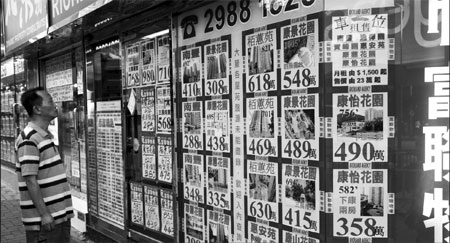Limited room for home price to cool
Updated: 2012-09-06 06:38
By Li tao(HK Edition)
|
|||||||
|
A man looks at advertisments on display in the window of an real-estate agency in Hong Kong. Although the government has taken many measures to curb the soaring property market, there is limited room for home prices to cool down, property consultants believe. Kevin Lee / Bloomberg |
Despite all the measures taken by the government to cool down the red-hot property market, there is limited room for a correction of Hong Kong home prices, given the extremely low interest rates and suppressed demand, property consultants in the city believe.
Tremendous demand from the city's end users, which was suppressed by government austerity measures over the years, will leave limited room for any significant price corrections in the near future, property consultant Jones Lang LaSalle said in its latest property report released on Wednesday.
At the same time, although home prices in Hong Kong reached one peak after another, the resilient job market as well as solid income growth has provided considerable support for the residential market, said the report.
Hong Kong's property prices have gained 13 percent in the first eight months this year, while residential transaction volumes have dropped to an average of only 7,000 a month during the same period.
Such a divergence between prices and volumes, seen for the first time in 15 years, is due to the government's austerity measures, including Special Stamp Duty levied on short-term home resell and the higher thresholds for new mortgages, according to Joseph Tsang, managing director of Jones Lang LaSalle's capital markets in Hong Kong.
"The end-user demand in Hong Kong, both new and upgrading, has been suppressed by the government's austerity measures and the wait-and-see approach of both prospective buyers and property owners in an uncertain economic environment," Tsang said during a media briefing on Wednesday.
"The resilience of the residential property market is not a bubble, but a realistic reflection of Hong Kong's long-term economic fundamentals," the report emphasized.
Although home prices have surpassed the previous peak in 1997 around 10 percent, the property consultant said the median income has increased about 25 percent and the mortgage payment burden has also been halved today based on the low interest rates, compared with the situation 15 years ago, making it conducive for Hong Kong people to enter the residential property market.
John Siu, executive director from another international property agency Cushman & Wakefield, echoed a similar view that notable residential prices adjustment in the near term is unlikely in Hong Kong due to the tight new home supply. The record low interest rates are also expected to be maintained for at least a couple of years as pledged by the Federal Reserve. Rates in Hong Kong normally move in line with those in the US due to the dollar peg.
"The market today is not like that back to 1997 when average household incomes are not even able to cover their mortgages," Siu told China Daily in a telephone interview. "In 1997, most of home buyers were speculators in the market, but the proportion of speculative activities these days is relatively low, which makes the market relatively stable at the moment."
Despite property consultants generally holding a bullish view on the city's property market, the Hong Kong government, on the other hand, has warned the public on numerous occasions to be prudent in entering the market as it had an embedded potential property bubble.
On August 30, Chief Executive Leung Chun-ying announced 10 new measures, including significant increases in housing supply in Hong Kong and banning out-of-town buyers from buying property in some local housing projects. The move was to alleviate the city's overheated housing problem after the survey showed that 90 percent of people in Hong Kong said the prices are unaffordable.
Ho Lok-sang, professor of Economics from Lingnan University, said although new policies are not likely to meet the near-term demands, the government is trying its best to lay out plans for the sustainable long-term developments of the city's residential market.
"Hong Kong's lackluster overall economic situation will also exert pressure on the hot-spot property sector," Ho said. "Home prices are not likely to rewind, but they are also unlikely to surge further given the gloomy economic outlook," Ho added.
litao@chinadailyhk.com
(HK Edition 09/06/2012 page2)
